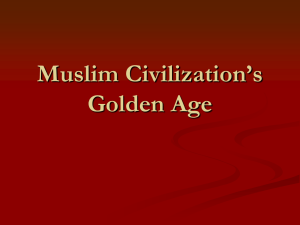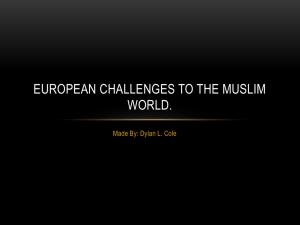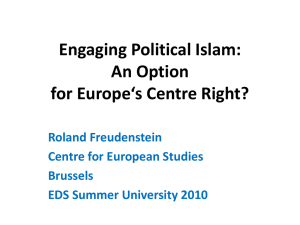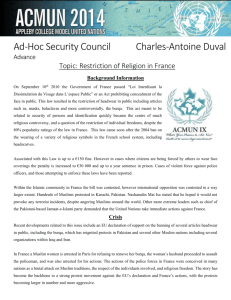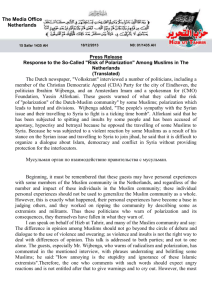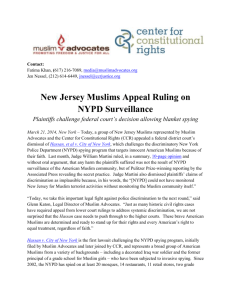Bruce Bawer reading
advertisement
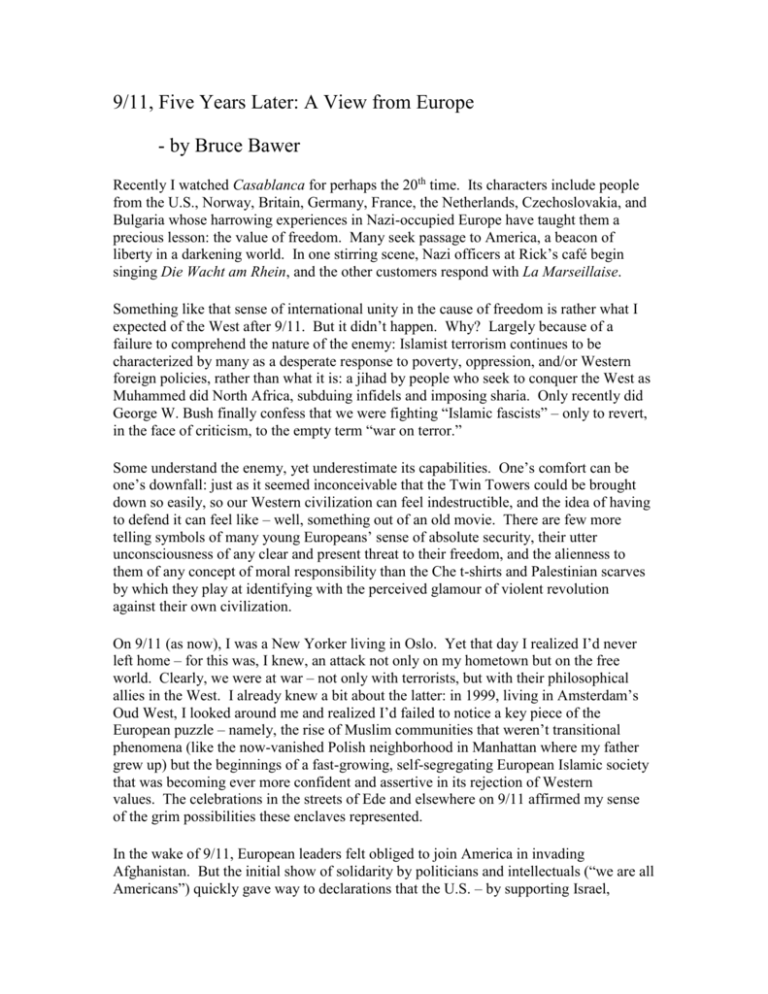
9/11, Five Years Later: A View from Europe - by Bruce Bawer Recently I watched Casablanca for perhaps the 20th time. Its characters include people from the U.S., Norway, Britain, Germany, France, the Netherlands, Czechoslovakia, and Bulgaria whose harrowing experiences in Nazi-occupied Europe have taught them a precious lesson: the value of freedom. Many seek passage to America, a beacon of liberty in a darkening world. In one stirring scene, Nazi officers at Rick’s café begin singing Die Wacht am Rhein, and the other customers respond with La Marseillaise. Something like that sense of international unity in the cause of freedom is rather what I expected of the West after 9/11. But it didn’t happen. Why? Largely because of a failure to comprehend the nature of the enemy: Islamist terrorism continues to be characterized by many as a desperate response to poverty, oppression, and/or Western foreign policies, rather than what it is: a jihad by people who seek to conquer the West as Muhammed did North Africa, subduing infidels and imposing sharia. Only recently did George W. Bush finally confess that we were fighting “Islamic fascists” – only to revert, in the face of criticism, to the empty term “war on terror.” Some understand the enemy, yet underestimate its capabilities. One’s comfort can be one’s downfall: just as it seemed inconceivable that the Twin Towers could be brought down so easily, so our Western civilization can feel indestructible, and the idea of having to defend it can feel like – well, something out of an old movie. There are few more telling symbols of many young Europeans’ sense of absolute security, their utter unconsciousness of any clear and present threat to their freedom, and the alienness to them of any concept of moral responsibility than the Che t-shirts and Palestinian scarves by which they play at identifying with the perceived glamour of violent revolution against their own civilization. On 9/11 (as now), I was a New Yorker living in Oslo. Yet that day I realized I’d never left home – for this was, I knew, an attack not only on my hometown but on the free world. Clearly, we were at war – not only with terrorists, but with their philosophical allies in the West. I already knew a bit about the latter: in 1999, living in Amsterdam’s Oud West, I looked around me and realized I’d failed to notice a key piece of the European puzzle – namely, the rise of Muslim communities that weren’t transitional phenomena (like the now-vanished Polish neighborhood in Manhattan where my father grew up) but the beginnings of a fast-growing, self-segregating European Islamic society that was becoming ever more confident and assertive in its rejection of Western values. The celebrations in the streets of Ede and elsewhere on 9/11 affirmed my sense of the grim possibilities these enclaves represented. In the wake of 9/11, European leaders felt obliged to join America in invading Afghanistan. But the initial show of solidarity by politicians and intellectuals (“we are all Americans”) quickly gave way to declarations that the U.S. – by supporting Israel, buttressing Arab dictators, fostering globalism, etc. – had asked for 9/11. But not Europe. Europe was the Muslims’ friend. Muslims knew this. Hence Europe was safe. This soon became Western European orthodoxy. Only days after 9/11, Norwegian author Gert Nygårdshaug sneered at the idea that there might soon be an attack on “Oslo or Rome or Copenhagen.” He was far from alone in his mockery. Then came Madrid, London, Bali, Beslan, Mumbai. Van Gogh was butchered; Muslims rioted in France; their coreligionists in Denmark rampaged over newspaper cartoons of Muhammed. The Western European elite played down, even denied, any connection among these events. Yet year by year the truth has become increasingly clear: though the U.S. was the target on 9/11, the front line of the war with Islamism is Europe. It is a war, moreover, in which the enemy’s most powerful weapon is not bombs but demography. Muslim immigration levels remain high; so do reproduction rates. Yes, only a tiny percentage of European Muslims are terrorists; but many more – who get their “news” from satellite channels such as Al-Jazeera and who feed one another’s animosity toward the West in mosques, in community centers, and on Internet message boards – find European culture intolerably decadent and share the jihadist goal of a European caliphate governed according to Koranic precepts. Recent polls show that at least 40% of Muslims in the U.K. would like to see Britain under sharia law, and that at least one in four approved of the 7/7 attacks. European-establishment rhetoric to the contrary, poverty and ignorance aren’t the explanation: the most intense anti-Western sympathies are nursed not by illiterate immigrants from rural Arab villages but by their welleducated, European-born children who live well and drive BMWs. In all of Europe, only the Danes have taken remotely serious actions to halt the advance of what the scholar Bat Ye’or has called “Eurabia.” The results: immigration to Denmark is down, integration improved. Yet even in Denmark, death threats against cartoonists have made the free word less free. Elsewhere, too, sharia is on the march. Belgian law now forbids “Islamophobia”; similar legislation was passed by Britain’s House of Commons last year, but nixed by the Lords. In Norway, you can now be imprisoned for “insulting” someone’s religion (and the burden of proof is on the accused). A grim foretaste of Europe’s future was provided last February in Oslo, where, at a statesponsored press conference, editor Velbjørn Selbekk – who, after reprinting the Muhammed cartoons, had defied death threats for weeks – did a sudden about-face, apologizing abjectly to the largest assemblage of imams in Norway’s history. The Norwegian government hailed this capitulation, calling it a “reconciliation”; later an official delegation visited Qatar to beg Muslim leader Yusuf al-Qaradawi’s forgiveness, too. What of America? No question, Bush’s arrogance, incompetence, inarticulateness, deafness to criticism, and tolerance of torture have (in Andrew Sullivan’s words) “managed to muddy the moral high ground against the evil of Islamism” – thereby polarizing Americans and helping alienate Europeans at a time when unity is crucial. (The U.S. military’s dismissal of desperately needed Arabic-language experts for being gay testifies to the endurance of an absurd bias that I thought, on 9/11, would fade in the face of a real and deadly foe.) In the U.S., as in Europe, politicians and journalists who should know better continue to repeat the ludicrous mantra that Islam means “peace,” jihad means “inner struggle,” and extremists are “hijacking Islam.” Yet for all America’s missteps, the European elite’s charge that the U.S. is the world’s #1 menace has been obscene and self-destructive – as has that same elite’s tireless whitewashing of the real menace. On 9/11, I would never have imagined that five years later, a man who refuses to condemn the stoning of female adulterers would be respected as the leading voice of “moderate” European Islam; that European governments would still be funding within their borders mosques and Muslim schools that teach contempt for democracy, Jews, gays, and sexual equality; that Amsterdam mayor Job Cohen would argue for accepting the oppression of Muslim women in the West; and that Britain would still be sheltering radical clerics, Queen Elizabeth knighting the likes of Iqbal Sacranie (who calls homosexuality “unacceptable”), and London mayor Ken Livingstone praising as “progressive” the above-mentioned al-Qaradawi (who has defended suicide bombers and the execution of gays). The delusion endures: in August, the AP reported that Germans were “stunned” by news of a planned train bombing in their country because they thought their “opposition to the Iraq war would insulate” them from terrorism; and Britain’s “Communities Secretary,” following the arrest of “English lads” who’d planned to blow up London-to-U.S. flights, promised to consider a proposal by Muslim leaders to pacify would-be domestic bombers by introducing sharia law in immigrant areas. I would never have believed on 9/11 that in 2006, most Europeans would still be surprised to learn – to pluck two examples at random – that over seven in ten immigrant women in Sweden (according to an EU study) are affected by “honor-related violence” and that Jewish children (according to a French government report) “can no longer get an education” in France because of abuse by Muslim classmates. Some law-enforcement authorities have already thrown in the towel: in 2004, Swedish police admitted they “have no control over the situation in Malmö,” a city plagued by Muslim rapes and robberies; this August, after a Muslim gang shootout in Oslo, police said they were “reluctant to crack down on the gangs out of fear for their own safety.” On 9/11, the free world was powerfully reminded of its freedom. In Europe, alas, that day’s spirit has been steamrollered by an establishment that – apparently having already accepted the inevitability of Europe’s Islamization – routinely turn the truth on its head, representing aggressors as victims and self-defense as inflammatory. That upside-down picture needs to be set aright, and the spirit of 9/11 resurrected. For the bottom line is simple: if we don’t cherish our liberties with the fervor that the jihadists treasure their faith, we’ll lose. DE VOLKSKRANT, 2 SEPTEMBER 2006 This piece was written at the invitation of the Dutch newspaper De Volkskrant, in which it appeared on September 2, 2006. it appeared on September 2, 2006.






